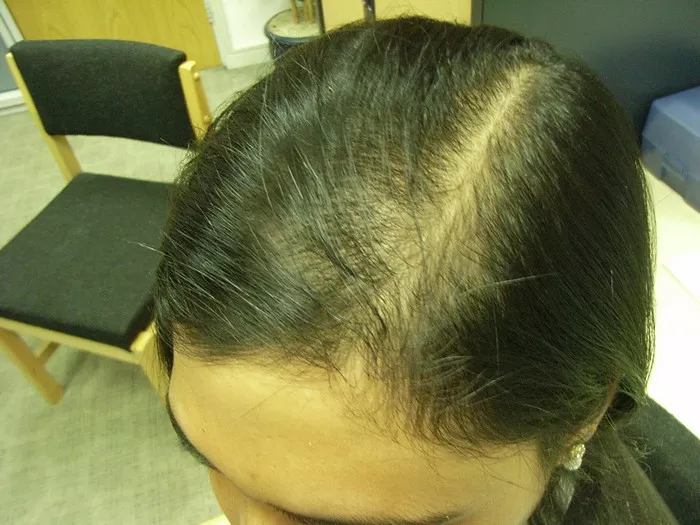Hair loss is a common concern that can be influenced by various factors, including genetics, hormonal changes, and lifestyle. However, one lesser-known factor that can contribute to hair loss is trauma. This article delves into the intricate relationship between trauma and hair loss, exploring the scientific basis behind it and offering insights into managing this challenging condition.
The Science Behind Hair Growth
Before delving into the impact of trauma on hair loss, it’s crucial to understand the basics of hair growth. Hair grows in cycles, with each hair follicle going through a growth phase (anagen), a transitional phase (catagen), and a resting phase (telogen). At any given time, a certain percentage of hair follicles are in each phase. It’s a delicate and finely tuned process influenced by various internal and external factors.
See Also: The Link Between Oxidative Stress and Hair Loss: A Full Analysis
Understanding Trauma-Induced Hair Loss
Here are some examples of hair loss caused by trauma:
1. Physical Trauma:
Physical trauma can directly impact the hair growth cycle. When the body experiences trauma, it triggers a stress response that can push a significant number of hair follicles into the telogen (resting) phase. This condition is known as telogen effluvium. The result is often a noticeable increase in hair shedding several months after the traumatic event. Common physical traumas that may lead to telogen effluvium include surgery, accidents, or severe illness.
2. Emotional Trauma:
Emotional or psychological trauma can also contribute to hair loss. The body’s response to stress, anxiety, or depression can disrupt the normal hair growth cycle. Chronic stress can lead to a condition called alopecia areata, where the immune system mistakenly attacks the hair follicles, causing hair to fall out in small, round patches. Additionally, prolonged emotional distress can contribute to telogen effluvium, similar to physical trauma.
The Role of Hormones
Hormones play a pivotal role in hair growth, and trauma can influence hormone levels. During stressful situations, the body releases cortisol, often referred to as the “stress hormone.” Elevated cortisol levels can disrupt the balance of other hormones, such as estrogen and progesterone, which are crucial for maintaining healthy hair growth. This hormonal imbalance can contribute to hair thinning and loss.
Managing Trauma-Induced Hair Loss
Here’s how to deal with hair loss caused by trauma:
1. Seek Professional Guidance:
If you suspect that trauma is contributing to your hair loss, it’s essential to consult with a healthcare professional. They can help identify the underlying causes and recommend an appropriate course of action. A dermatologist or a trichologist, a specialist in hair and scalp disorders, can provide valuable insights into managing and treating trauma-induced hair loss.
2. Address the Underlying Trauma:
While managing the physical symptoms of hair loss is crucial, addressing the underlying trauma is equally important. Seeking therapy or counseling can be beneficial in managing emotional stress and its impact on overall well-being. Techniques such as cognitive-behavioral therapy (CBT) and mindfulness practices have been shown to be effective in reducing stress and anxiety.
3. Adopt a Healthy Lifestyle:
Maintaining a healthy lifestyle can positively influence hair growth. Ensure a well-balanced diet rich in vitamins and minerals essential for hair health, including vitamin E, vitamin D, and biotin. Regular exercise can also help manage stress levels and promote overall well-being.
4. Consider Topical Treatments:
Topical treatments, such as minoxidil, may be recommended by healthcare professionals to stimulate hair growth. These treatments work by increasing blood flow to the hair follicles and extending the anagen (growth) phase of the hair cycle. However, it’s crucial to use these treatments under the guidance of a healthcare professional.
Conclusion
While the connection between trauma and hair loss is complex, understanding the underlying mechanisms can guide individuals in managing this challenging condition. Whether the trauma is physical or emotional, the impact on the body’s stress response and hormonal balance can influence the hair growth cycle. Seeking professional guidance, addressing the underlying trauma, adopting a healthy lifestyle, and considering topical treatments are key steps in managing trauma-induced hair loss. By taking a holistic approach, individuals can work towards restoring not only their hair but also their overall well-being. If you’re experiencing significant hair loss, it’s advisable to consult with a healthcare professional for personalized guidance and treatment options.


